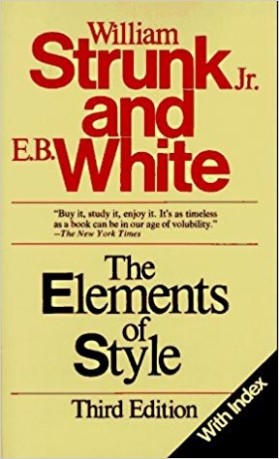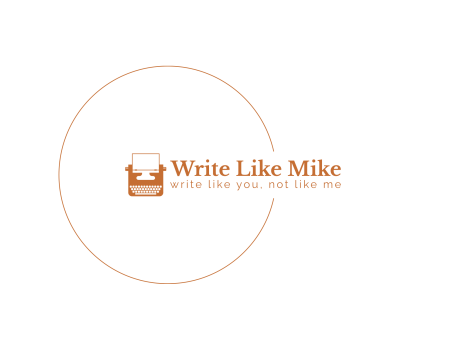Have you ever been serenaded by the line “I love to sing!” or had a conversation with someone about talking too much? If you answered “yes” or “hell yes!” or “please make it stop” then you’re in for a real treat with this post. Today, I’m writing about writers writing about writing. One could argue that writing about writing is a perfect marriage of form and function. Often, it’s considered a rite of passage. As my friend and fellow blogger Greta Brueck eloquently said in her March essay, “what I’m attempting here is nothing new. It’s just that I have to say it. I’m still trying to earn my place in that camp.” Here, I’ve compiled my five favorite writing books to date. I hope they help you as much as they have helped me!

1. On Writing by Stephen King
Put aside what you may know about Stephen King and prepare for one of the best books on writing. It’s one-part writing lesson, one-part autobiography, and one-part writing blueprint. I never took daily word counts seriously until reading this. King suggests 2,000 words, 5-6 days a week, but for the rest of us mortals even 1,000 words a day is a game changer. I am currently in the drafting stage of a novel and set my goal at 5,000 words a week. I have about a 50% success rate. But even when I don’t hit my goal, I still have something to show for it.
King also reminds us that every writer has her own vocabulary, no matter how big or small. Dressing up your vocabulary is “like dressing a household pet in evening clothes…Never say John stopped long enough to perform an act of excretion when you mean John stopped long enough to take a shit” (King).
In other words, it’s not the size of the vocabulary, ladies; it’s how you use it.
As you can probably tell, I tend to write in pretty plain language. Of course, so did this guy, and he seemed to do all right.

2. Naming the World by Bret Anthony Johnston
This book, edited and curated by Bret Anthony Johnston, is like having a staff of creative writing teachers on speed dial. Johnston, a literary star (Corpus Christi, Remember Me Like This), has recruited his “favorite writers and teachers of writing, those whose work and guidance continue to influence [his] own fiction and whose examples have proven invaluable to [his] students over the years” (xix). Sections of the book are thoughtfully categorized by topic such as Point of View, Character, Plot, Dialogue, Details, and Revision. Johnston offers his personal take on each while using his writing network to fill in the gaps. Each “mini-lesson” includes a writing exercise, most of which don’t suck. Contributors include Joyce Carol Oates, Richard Bausch, Steve Almond, Robert Boswell, and Amy Hassinger among over forty more. As far as I know, all essays and exercises are exclusive to this book. For anyone looking to brush up on craft or inject life into their writing post MFA, this is for you.

3. Bird by Bird by Anne Lamott
Lamott’s witty book of essays on writing may be the perfect pick-me-up for when you have the writerly blues. She talks of rejection, and ditches basic writing instruction in favor of emotional support. I was first introduced to Lamott through her essay “Shitty First Drafts,” which has become a staple in my composition classes. Irreverent and wise, she reminds us that “All good writers write [shitty first drafts]. This is how they end up with good second drafts and terrific third drafts” (21). She can only think of one writer who writes “elegant first drafts…but we do not like her very much. We do not think that she has a rich inner life or that God likes her or can even stand her” (21-22). She says that “the first draft is the child’s draft, where you let it all pour out and then let it romp all over the place” (22). I take comfort in her reminder that “almost all good writing begins with terrible first efforts” (25). You know it’s a good book when you can’t put it down long enough to write a review of it.

4. The Elements of Style by Strunk and White.
Now, did you really think we were going to get through a list on the best writing books without Strunk & White crashing the party? Though it has been referred to by some as a “horrid little compendium of unmotivated prejudices,” and “truly silly advice” (Pullum) this book still earns a place here on my list of recommendations as a good starting point. It emphasizes above all the purpose of the writer: to communicate. Every rule, dictum and decree found in this volume is meant to help clear up confusion. The reader often times is “floundering in a swamp” and it’s the writer’s job to “drain the swamp and get the reader up on dry ground, or at least throw a rope” (White). Grammatical grievances and pet peeves aside, the spirit of the book rings true.
Here’s one of my favorite passages on the importance of being clear:
“Muddiness is not merely a disturber of prose, it is also a destroyer of life, of hope: death on the highway caused by a badly worded road sign, heartbreak among lovers caused by a misplaced phrase in a well-intentioned letter, anguish of a traveler expecting to be met at a railroad station and not being met because of a slipshod telegram. Think of the tragedies that are rooted in ambiguity, and be clear! When you say something, make sure you have said it. The chances of your having said it are only fair” (White).
For those of you looking for an update with attitude, I recommend The Elements of F*cking Style: A Helpful Parody. Wildly inappropriate and, at times, offensive, this may be the first grammar book you read cover to cover. With insights such as “Symmetry is the tits,” and “Pronouns are a real bitch,” you may find that after the laughing has died down you have actually learned something.

5. Interviews from the Paris Review
Over the last 70 years, The Paris Review has conducted interviews with the world’s most prestigious authors. Now they are all available for free online. [Update 2021: These interviews are now behind a paywall, but can still be accessed for free with the use of “waybackmachine.” Simply copy in the url you want to view, click a snapshot from a few years back, and you will be immersed in more writing craft than is probably healthy for you.] Browse by decade or author name. You are sure to find something to inspire you. Not to mention, many of the interviews are with writers who are notoriously reclusive and hard to get in front of a tape/iPhone recorder. For those looking for a print edition, a selection of the interviews have also been published in a four-volume set.

BONUS ROUND
Probably the most important book you can read to improve your writing is the one you already have. It might be sitting on your nightstand, buried in your backpack, or languishing on your windowsill. Always be reading books by authors you admire. Hopefully you love to do this anyway, but for those having trouble keeping a reading schedule (and it can be difficult), remember that even just reading 15-20 minutes a day equals 5,475+ pages a year! If your average novel is 300 pages, that’s 18 books a year.
Do you have a favorite book on writing that I failed to mention in this list? Do you disagree with my picks? Let me know in the comments! Thanks for reading.
Works Cited
Brueck, Greta. “On Writing: Seek. Capsize. Repeat.” Greta Brew, Morningbrue, 4 Mar. 2017, morningbrue.wordpress.com/2017/03/05/on-writing-seek-capsize-repeat/. Accessed 19 May 2017.
Pullum, Geoffrey K. “50 Years of Stupid Grammar Advice.” The Chronicle of Higher Education, The Chronicle of Higher Education, 17 Apr. 2009, http://www.chronicle.com/article/50-Years-of-Stupid-Grammar/25497. Accessed 19 May 2017.
Pullum, Geoffrey K. “Language Log: Red Sox Win.” Language Log, Institute for Research in Cognitive Science at the University of Pennsylvania, 28 Oct. 2004, itre.cis.upenn.edu/myl/languagelog/archives/001604.html. Accessed 19 May 2017.
Johnston, Bret Anthony. Naming the World: and Other Exercises for the Creative Writer. New York, NY, Random House, 2007.
King, Stephen. On Writing: a Memoir of the Craft. New York, NY, Scribner, 2010.
Lamott, Anne. Bird by Bird Some Instructions on Writing and Life. New York, Anchor Books, 1995.
Strunk, William, and E. B. White. The Elements of Style. Essex, Pearson New International Edition, 2014.
Various Authors. “Interviews.” The Paris Review, 1950, www.theparisreview.org/interviews. Accessed 19 May 2017.


My first citation! I’m honored, Mike. Also excited to see Mr. King’s On Writing at the top of your list! Chris gave that to me for Christmas a few years ago and I ate it right up.
LikeLike
Haha no problem! Yeah, it’s a great book and I need to dig it out again and reread it.
LikeLike